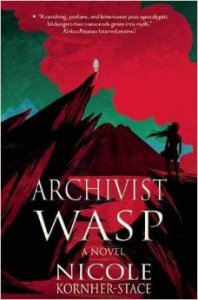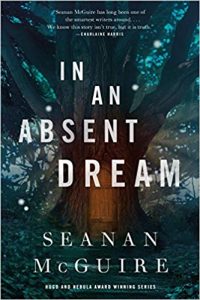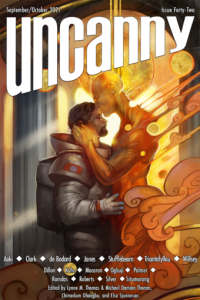Paul Di Filippo reviews Nicole Kornher-Stace
Archivist Wasp, Nicole Kornher-Stace (Small Beer Press/Big Mouth House 978-1618730978, $14, 256pp, trade paperback) May 2015
 I regret that I neglected to note the appearance of Nicole Kornher-Stace’s first novel, Desideria, upon its debut in 2008, shortly after her first story, “Pieces of Scheherazade,” had appeared in 2006 and garnered her inclusion in a Year’s Best compilation. Reading various reviews of Desideria now makes it sound like just my cuppa. But I won’t make the same mistake with her sophomore release, Archivist Wasp, and I can always work my way backwards along her career path! That’s why God invented Amazon and Barnes & Noble and AbeBooks.
I regret that I neglected to note the appearance of Nicole Kornher-Stace’s first novel, Desideria, upon its debut in 2008, shortly after her first story, “Pieces of Scheherazade,” had appeared in 2006 and garnered her inclusion in a Year’s Best compilation. Reading various reviews of Desideria now makes it sound like just my cuppa. But I won’t make the same mistake with her sophomore release, Archivist Wasp, and I can always work my way backwards along her career path! That’s why God invented Amazon and Barnes & Noble and AbeBooks.
The overarching category into which our tale falls is “postapocalypse,” a well-worked vein, especially during the 21st-century’s present cultural fix. But there are enough twists and turns to render the novel satisfyingly different. It bears honorable affinities to such classics as Fred Saberhagen’s Empire of the East series.
The small harsh settlement of Sweetwater, under the aegis of the goddess Catchkeep and her priest, is plagued by ghosts, “faceless silver paper-doll cutouts the size of mice.” But the ghosts are not harmless; they are capable of wreaking physical damage on property and persons. The villagers’ only defense against the ghosts is the young woman dubbed Archivist. With her ghost-trapping tools, including a unique blade, she can purge the spirits, rendering them truly dead. In the process, she is supposed to examine the ectoplasmic remnants for clues about the ancient collapse of civilization, some four hundred years or more gone.
Our heroine, the current Archivist, is named Wasp, and we witness her during the prologue barely surviving the ritual challenge to her duties. So she is in a grim, applecart-upsetting mood when a different kind of ghost approaches her. Man-sized and communicative—how strange!—the ghost wishes to “hire” Wasp to track down one of his dead peers. (For some odd reason perhaps peculiar to me, I kept flashing on Harlan Ellison’s time-stranded savior from “Demon with a Glass Hand” when the ghost spoke.) And so Wasp and companion leave Sweetwater behind for an odd hegira. Along the way, Wasp discovers the ability to mentally relive the pre-collapse life of Foster, the woman who is the ghost’s quarry. Thus the ancient quest to understand what brought down civilization is eventually fulfilled. And Wasp has a chance to change her village for the better.
Kornher-Stace exhibits immense fluidity and grace of prose. She is able to evoke the creepy, barren, stifled post-collapse world; the other-dimensional byways down which the ghost brings Wasp; and the pre-collapse Project Latchkey environment where Foster works, all in differing but equally vivid styles. The reader will feel the cold and damp, the scalpels and clamps, the fairytale ambiance of a ghostly “waystation,” with exactitude and weight.
Likewise, Kornher-Stace exhibits fine skills with characterization: Wasp and the ghost both emerge fully rounded. And her action scenes are cinematic.
But all these skills are, I fear, slightly impeded from full flowering by two choices the author made.
The first is that there is really no one in this book but two people. Wasp and the ghost.
The villagers get some cameo appearances at start and end. But once Wasp leaves Sweetwater with the ghost, there is literally no one else to sustain the action. This burden is something that can be brought off in Waiting for Godot or Neil Gaiman’s “‘The Truth Is a Cave in the Black Mountains…’.” But those are much shorter works. In any novel, we yearn for a bigger cast, to have our protagonist interact with as many people as the plot will allow.
But wait, you say, what about all that good stuff with Foster? Plenty of additional characters there, you rightly note.
Well, kinda. These are visions caused by ghost blood. These people are all dead. Wasp can only witness their unspooling traces. She can’t interact. And the undeniably fixed nature of their deeds, the immutable and helpless fate of Foster and crew, however deftly the Latchkey enigma is protracted before being revealed, distances the reader from full involvement with them.
These two factors—the limited cast and the dead hand of the past—have an effect of lessening the immersiveness and immediacy of the book—at least for me. While I applauded Wasp’s spunk and took interest in her challenges and how she might surmount them, I felt somewhat thwarted from getting fully invested in this world, due to limited exposure on all fronts.
If we look at John Crowley’s masterpiece, Engine Summer, a book with many of the same themes and tropes, I think readers might see what’s missing here.
Archivist Wasp arrives from Big Mouth House, the imprint of Kelly Link’s and Gavin Grant’s Small Beer Press that specializes in books for Young Adults, and this novel is so labeled. But its vast virtues and wise lessons hold full appeal for any age group, despite its brushes with a narrowness of scope.






I totally disagree that the lack of more than two viewpoint or other well-rounded characters ruined the book.
The novel is about Wasp’s growth and the past’s relationship to the present, and the author sticks to this with a laser focus.
If the characters in the past, beyond Foster, and/or the characters in the present had been more fully developed, the book would have been bloated or lopsided, and much of the book’s strength would have been diluted or lost.
If you go into this expecting an epic, you won’t get it, but, if you go into this expecting a great story, you won’t be disappointed.